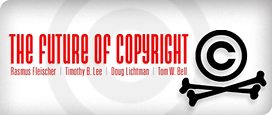Lead Essay
“How relevant is it to declare oneself to be ‘for’ or ‘against’ copyright? Neither the stabilization nor the abolition of the copyright system seems within reach. All we see is a seemingly endless assembly line of new extensions to the law being proposed and enacted,” writes Rasmus Fleischer in this month’s Cato Unbound lead essay. Meanwhile, digital copying technologies continue to grow exponentially in storage capacity, to the point where a handheld device may soon be able to carry all music ever recorded and released. This threatens to make a mockery of copyright law, and those who support the extensions of current regime are fighting back. “Every broken regulation brings a cry for at least one new regulation even more sweepingly worded than the last. Copyright law in the 21st century tends to be less concerned about concrete cases of infringement, and more about criminalizing entire technologies because of their potential uses,” writes Fleischer, who predicts “seriously chilling effects on innovation, as the legal status of new technologies will always be uncertain under ever more invasive rules.”
Response Essays
It is often supposed that giving individuals more freedom to share copyrighted materials with one another will amount to the abolition of copyright. But this is far from true… The copyright policies of the last decade have been based on the idea that copyright is about controlling unauthorized copying. An alternative is to treat copyright as a limitation on commercial exploitation of creative works. Under this option, individuals could make any non-commercial use they liked of copyrighted works, including sharing them with strangers on the Internet, without fear of legal consequences. Copyright law would focus on commercial entities, who are both easier to regulate and better equipped to deal with copyright law’s complexities.
Copyright law and copyright policy are both in the midst of enormous change. That doesn’t mean copyright is dying. The technologies available to facilitate the creation and distribution of creative work have themselves undergone enormous change. Copyright law is of course following suit, but as it does, we must make certain that those in the creative professions can still survive.
Tom W. Bell raises a question: Copyright enforcement always has costs. How high are we willing to allow those costs to rise? How harsh, in other words, will we allow copyright law to become, as a counterweight to the ease with which people now can copy digital media? It is conceivable, he argues, that these costs might become too great, and that we will be forced to allow copyright to end, rather than bearing them.

